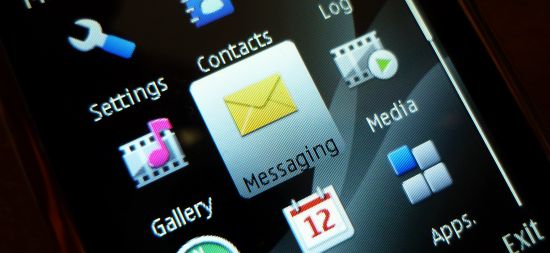
[X-Posted from E-Blogs, a European Review of Blogs,translated by Ulrike Anderson]
Yesterday I cleaned up my mobile again. The some hundred SMS I have were – no, not deleted! – but saved. I’m sure this makes me part of a tiny minority of contemporaries. I mean, who archives their sent (as well as received) SMS? Clearly a case of a professional deformation, no doubt.
But as I did so, a few questions came to mind: of the approximately 1,500 messages I had accumulated on my phone, around three quarters of them are totally insignificant; appointment scheduling and such. Of the remaining quarter, most are interesting, but also not really worth saving for posterity’s sake. And then there are maybe a handful of text messages that I want to save. Like some scraps of paper from my childhood and school years that I’ve saved in a box somewhere.
Of course I could have searched for these few, short messages, saved them and deleted the rest. I could have, but I didn’t. That was far too inconvenient. So, I had the “Nokia PC Suite” save the entire folder. That was much easier, took about five seconds and only uses 120KB of storage space for the received and another 120KB for the sent messages. Of course, I have thereby actually “deleted” the few relevant SMS, because I will never scour all of the messages in order to find the important (allegedly important) messages that I might, someday like to re-read. And I will never, ever make an effort to reconstruct any dialogues I held via SMS in 2010.
And still, with yesterday’s act, I have the feeling of having held onto a part of my daily life. What a bunch of rubbish, I know. What happened to me yesterday on a small scale is exactly what can currently be observed happening everywhere on a large scale: we let ourselves be blinded by the phantasm of the store-everything-option. We are not ready to let go of the flood of information. We, to put it simply, are not ready to embrace the art of forgetting.
The retired ancient history professor Christian Meier has recently addressed the “bid to forget and the irrefutability of remembering” in a nice essay. In a tour de force through history, he describes the “public interaction with bad history” (the subtitle) and comes to the conclusion that “memory culture” is an extremely questionable term (p 78). Even if much of what Meier put down onto approximately 100 pages of paper isn’t really new, the merits of this small volume lie in the fact that Meier points out the identity-establishing function of memory for nations and questions it critically. Without going into the new media of memory and the discourse on memory in the digital age in detail, Meier’s essay lies within the context of the changing media of our time.
What does this have to do with my SMS? That I suspect that we, now that the topic of “memory” is slowly disappearing from our cultural sciences again, will soon approach – and this time founded in media theory – the at least equally fascinating topic of forgetting; in the history sciences as well as in related disciplines.
As an introduction is recommended – as so often – a text by the late (as of 2009), great historian Yosef Chaim Yerushalmi: “Über das Vergessen” (Reflections on Forgetting); available in the collection of essays “Ein Feld in Anatot. Versuche über jüdische Geschichte” (A Field in Anatot. Essays on Jewish History), (Berlin 1993).

Dear Peter, it was very nice reading how you got challenged by the small gadget and its functionality. In fact, I (who not?) had the same problem. Last time I changed my phone, I just did not find the time for any such migration activities … and got rid of it all, except for the contacts! Funny: I felt relieved and it was only once or twice that I missed one of the pics or messages lost. Living and accepting the risk!
Replacing your personal assessment or appraisal criteria with legal or regulatory requirements would describe the situation for companies when facing retired applications and Tera Bytes of unmanaged business data. What you call the large scale is in fact the domain of the so called Information and Records Managers that try to apply grounded retention criteria to data and thus gain control on it. While „IT Departments“ try to sell Back Up Solutions (i.e. „In dubio pro Archivo“) the business is no longer willing to pay enormous amounts of money to store „hay heaps“ of data that no one really knows why it is kept, believing to find the required bits in due time … some when, in 15 years, maybe ….
Yes, I am sure that this is going to be a challenge in the near future for big companies … and individuals as well, with their 2 TB USB 2.0 Harddisks (140.- CHF!) at home, storing masses of pictures, mp3 files, movies, versions of versions of „backups“ of „backups“ of „backups“ … as it is cheaper to keep it redundant than to actually manage it:-)